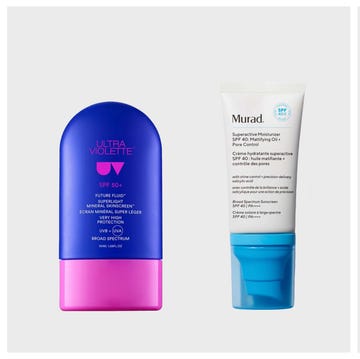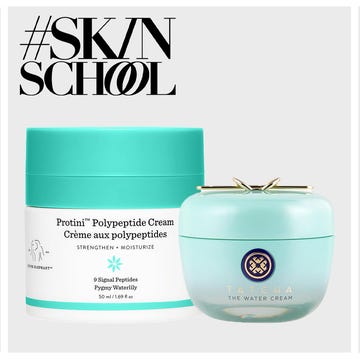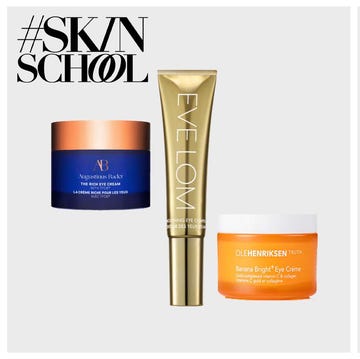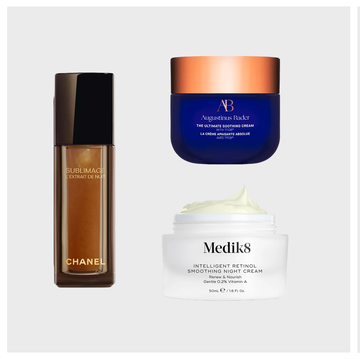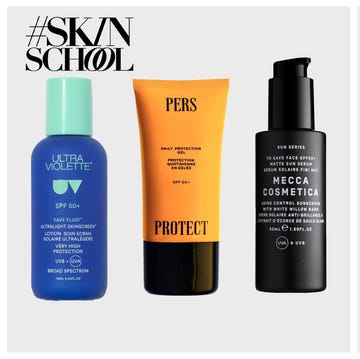If you're even slightly interested in skincare, it's likely you've heard the word 'ceramide' being bounced around when discussing the topic of moisturising. Hyaluronic acid and glycerin have built strong reputations as the go-to ingredients for improving hydration in the skin, but it's high time for ceramides to get their flowers.
You'll find ceramides in the INCI lists of many moisturisers, masks, serums and toners, thanks to their beneficial effects on our skin. "Each ceramide has unique properties that contribute to the functioning of a healthy skin barrier," explains dermatologist Dr Derrick Phillips.
The skin barrier has become its own buzzword in recent years, and as more of us become aware of the implications of a damaged one, brands are increasingly focused on creating formulations that help to repair and protect it. While it's true that our skin barrier becomes more prone to damage in the winter months — due to factors such as low temperature and lack of humidity — it's important that it functions optimally all year round to keep our skin at its best.
Below, we break down everything you need to know about ceramides, including what they can do for your skin and the best ceramide-rich skincare to shop.
What are ceramides?
Ceramides are lipids (fats) that are absolutely essential for maintaining the strength of our skin barrier and allowing it to work at its best. "Your skin barrier is there to keep harmful things like pollution and bacteria or pathogens out whilst preventing trans-epidermal water loss, which is water loss through the skin barrier," explains skin expert and aesthetic practitioner Dr Christine Hall.
Much like the mortar that holds the bricks of our houses together, ceramides exist in the outermost layer of our skin, combining with other fatty acids to protect our skin cells and fortify our skin barrier. Ceramides are produced by our sebaceous glands, which can be disrupted by certain factors; "When the weather gets colder and as we age, our sebaceous glands get smaller and we produce less crucial ceramides, causing our skin to be drier," says Dr Hall.
What do ceramides do for the skin?
Owing to their vital role in the maintenance of our skin barrier, ceramides are a multi-hyphenate in terms of what they can do. "They help retain moisture, protect against environmental aggressors, and prevent dryness, irritation, and sensitivity by forming a protective seal between skin cells," says Dr Phillips.
If you manage to preserve the levels of ceramides in your skin, less moisture will be able to escape, resulting in your skin feeling and looking more hydrated. When those levels start to decrease, cracks start to appear in the mortar, and more moisture is able to escape, manifesting in all sorts of skin issues.
Though ceramides deplete in our skin as we get older, it's also an issue that can affect individuals of all ages; "By contributing to a healthy skin barrier, ceramides help to lock in moisture which will show outwardly as plump, hydrated skin," says Dr Christine. "Fine lines and wrinkles will be smoother and redness and irritation will be eased."
How can I tell if my skin needs ceramides?
Ceramides are quite unique, in so much as all skin types can benefit from using them. That's because a weak or irritated skin barrier and dehydration can affect those with dry, oily and combination skin.
"Signs that your skin may benefit from ceramides include dryness, tightness, flakiness, and increased sensitivity, all of which occur as a result of a compromised barrier," explains Dr Phillips. "If your skin struggles to retain hydration despite moisturising, or reacts poorly to environmental stressors, ceramides can help alleviate these symptoms."
That said, those with dry skin will see a particular benefit from using ceramides in their daily skincare routine, especially when incorporating ceramide-rich serums and moisturisers. "As you make less ceramides with age, those in their forties, and those who are peri or post-menopausal will also see a difference," says Dr Christine.
What are the best ceramide products?
As mentioned above, the best ceramide products will differ for each skin type, depending on which other ingredients it's been formulated with and how they interact with your skin. "The gold standard product will combine ceramides with complimentary properties to help retain moisture and repair the skin barrier," says Dr Phillips
According to Dr Phillips and Dr Hall, ingredients that pair well with ceramides include niacinamide, hyaluronic acid and glycerin, which all individually help to boost the skin barrier.
Dr Hall recommends that those with oily or acne-prone skin should avoid "thicker, richer oily formulations, which can worsen breakouts," and instead opt for lighter formulations such as toners and lightweight serums.
"Avoid pairing ceramides with alcohol-based products and harsh exfoliating cleansers which strip away naturally-occurring ceramides from the skin and weaken the skin barrier," she adds.
Below, find our edit of the best ceramide products for all skin types.















